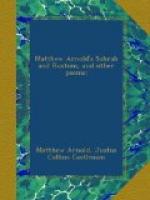=15. Ajax, or Aiax.= One of the leading Greek
heroes in the siege of Troy, famous for his size,
physical strength, and beauty. In bravery and
feats of valor he was second only to Achilles.
Not being awarded the armor of Achilles after that
hero’s death, he slew himself.
[190]
=16.= Helen, the wife of Menelaus, king of Sparta,
was celebrated for her beauty, by reason of which
frequent references are made to her by both classic
and modern writers. Goethe introduces her in the
second part of Faust, and Faustus, in Marlowe’s
play of that name, addresses her thus:—
“Oh! thou art fairer
than the evening air
Clad in the beauty of a thousand stars.”
Her abduction by Paris, son of Priam (see note, l. 3), was the cause of the Trojan war, the most notable incident of Greek mythology, which forms the theme of Homer’s greatest poem, the Iliad.
What is the central thought of the poem? Of what is the Palladium typical? Explain the thought in stanza 3. What is the force of the references of stanza 4? Discuss the use of the words “rust” and “shine,” l. 17. Just what is meant by “soul” as the word is used in the poem?
SELF-DEPENDENCE
Self-Dependence is a poem in every respect characteristic of its author. In it Arnold exhorts mankind to seek refuge from human troubles in the example of nature.
Picture the situation in the poem. What is the poet’s mood as shown in the opening stanzas? From what source does he seek aid? Why? What answer does he receive? What is the source of nature’s repose? Where and how must the human soul find its contentment?
[191] GEIST’S GRAVE
This poem appeared in the January number of the Fortnightly Review for 1881.
=12. homily.= Sermon.
=15. the Virgilian cry.= Sunt lacrimae rerum! These words are interpreted in the following line.
=42. On lips that rarely form them now.= Arnold wrote but little poetry after 1867.
=55-56. thine absent master.= Richard Penrose Arnold, the poet’s only surviving son.
EPILOGUE TO LESSING’S LAOCOOeN
Gotthold Ephraim Lessing (1729-1781) was a celebrated German dramatist and critic. For a time he studied theology at Leipsic, then turned his attention to the stage, and later to criticism. His greatest critical work (1766) is a treatise on Art, the famous Greek statuary group, the Laocooen, which gives the work its name, forming the basis for a comparative discussion of Sculpture, Poetry, Painting, and Music.
=1. Hyde Park.= The largest park in London, and the principal recreation ground of that city.
=15. Phoebus-guarded ground.= Greece. Phoebus, a name often given Apollo, the sun god.




